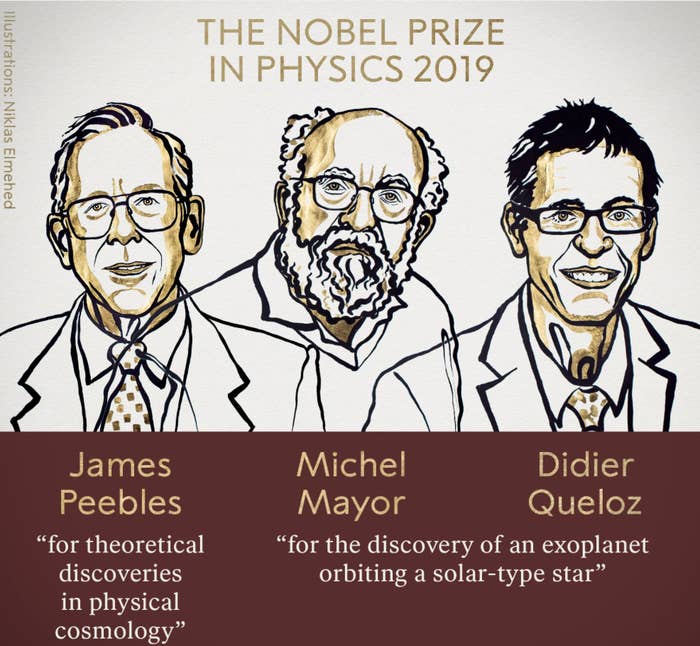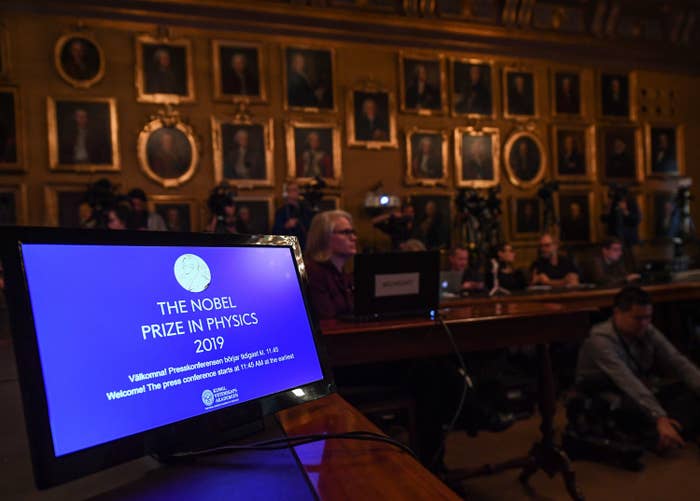
One American and two Swiss scientists were jointly awarded the 2019 Nobel Prize in Physics on Tuesday morning for their discoveries about the nature of the universe and the first planet seen orbiting a sun-like star outside our solar system.
James Peebles of Princeton University was awarded the prize for cosmological discoveries, and Michel Mayor and Didier Queloz of Switzerland's University of Geneva were honored for the 1995 discovery of the planet 51 Pegasi b, according to the announcement from the Royal Swedish Academy of Sciences in Stockholm.
"Their discoveries have forever changed our conceptions of the world," the Nobel Committee tweeted.

Peebles was awarded half of the prize for explaining how to understand cosmic microwave radiation, a leftover heat signature from the first 400,000 years of the universe after its birth 13.8 billion years ago. "Using his theoretical tools and calculations, James Peebles was able to interpret these traces from the infancy of the universe and discover new physical processes," the academy said in its prize announcement.
Starting in the 1960's, his work revealed that everyday matter — the stuff of stars, planets, and people — is only about 5% of the material of the cosmos. The rest is dark matter, an unobservable kind of matter that shapes galaxies, and dark energy, a force that is leading to the accelerating expansion of the universe.
"These things just happen," Peebles said of his discoveries, in a news conference arranged by the academy. He called winning the Nobel "charming," but added, "you should enter science because you are fascinated by it," rather than for prizes.
You might think I'd be all excited about Nobel prize for exoplanets, but it's actually the prize for Jim Peebles that has me grinning. The first scientific paper I ever wrote (uh 32 years ago) was with him as an [excellent] advisor! https://t.co/IspdrJ8vsi
"They say the Nobel isn't a lifetime achievement award but Peebles has contributed so broadly across so many areas for so long, that it almost is," David Pendlebury of the Institute for Scientific Information told BuzzFeed News. Peebles' 1965 paper on background radiation in the universe was lauded by the prize committee, but Pendlebury noted his most cited papers date to 1988 and 2003.
Mayor and Queloz, who also has an appointment at the University of Cambridge in the United Kingdom, will split the other half of the prize for the 1995 discovery of 51 Pegasi b, a planet orbiting a sun-like star about 50 light-years away (one light-year is about 5.9 trillion miles) in the constellation, Pegasus. The discovery showed that solar systems come in unexpected forms, with the planet, a "Hot Jupiter" much bigger than Earth roasting on a close-in orbit of its star.
"Their groundbreaking work on discovering the fundamental nature of the universe and new worlds in distant solar systems has opened up whole new areas of research," said Michael Moloney of the American Institute of Physics, in a statement on the prize. "Discovery of a planet orbiting a star outside our own system has changed our perceptions of our place in the universe."
The discovery of the "exoplanet" kicked off a boom in astronomy, pioneering a method of detecting the back and forth wobbles of stars caused by planets like 51 Pegasi b tugging on them as they orbit. Thousands of planets have since been discovered orbiting nearby stars in the last two decades.
The Swedish academy yearly awards the physics prize to up to three people judged to have made "the most important discovery or invention within the field of physics," as dictated by the 1895 will of industrialist Alfred Nobel, the inventor of dynamite.
The award winners will split the prize of 9 million Swedish kronor (about $908,000) and in a Dec. 10 ceremony receive gold medals from the King of Sweden.
